5. Daniel Craig and Eva Green in “Casino Royale”
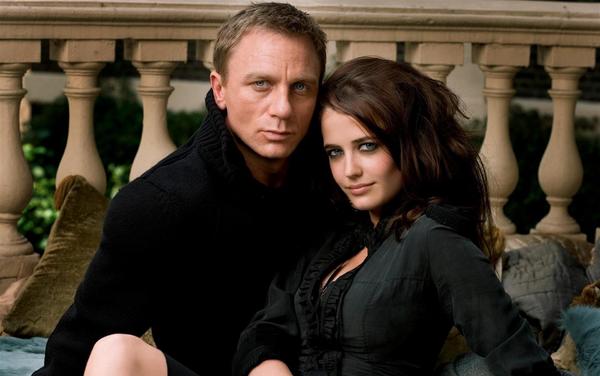
“I’m the money.” With a calm, cool smile, Green delivered those words to James Bond (Craig), leaving him forever hooked. It was only Green’s third film role, but when the movie was released in 2006, you could have been forgiven for mistaking her for a veteran of classic Hollywood. Already, she carried herself with the poise of Grace Kelly, the mischievousness of Barbara Stanwyck, and a lordly glamour that was all her own.
Of course, “Casino Royale” ultimately belonged to Craig, and no one has ever matched Green’s sultry strength the way he has. Like two tigers who have spent too long trying to mate with house cats (or in Green’s case, Michael Pitt in “The Dreamers”), they spend “Casino Royale” circling each other with an intoxicating mixture of wariness, interest, and lust that offers a modern echo of Cary Grant and Eva Marie Saint’s delicious and dangerous affair in “North by Northwest.”
That said, unlike Saint’s character in that Hitchcock masterwork, Green’s Vesper Lynd was marked for death in “Royale.” Yet nothing could snuff the savory friction between her and Craig, especially when she delivers the killer line, “So as charming as you are, Mr. Bond, I will be keeping my eye on our government’s money, and off your perfectly formed ass,” and Craig responds to with an impish reply: “You noticed.”
4. Kirsten Dunst and Tobey Maguire in the “Spider-Man” trilogy
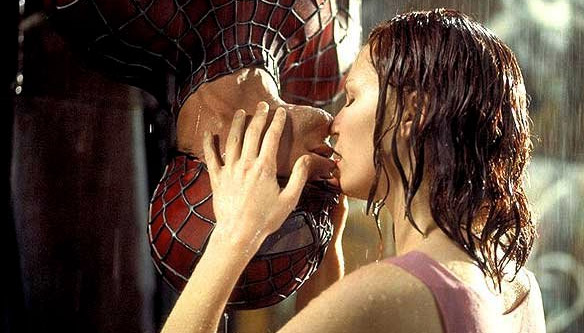
“But let me assure you: This, like any story worth telling, is all about a girl.” For some moviegoers, that declaration from Peter Parker at the start of the original “Spider-Man” film might have struck an odd note.
After all, wasn’t the movie supposed to be about an acrobatic vigilante slugging it out with guy with a goblin fetish? Not so much, it turns out. For all their delightfully cartoonish visual flourishes, Raimi’s “Spider-Man” films also turned out to be the story of Peter and Mary Jane falling for each other.
This relationship was solidified by two exquisite scenes, the first of which is set in a hospital room, where Peter delivers a veiled yet unmistakable declaration of adoration. The shaken but loving expression on Dunst’s face in that moment is worth the price of admission alone, as is Maguire’s look of luminous happiness when his affections are later returned during a beautiful encounter between the two in a graveyard.
Like the entire trilogy, those scenes rebuked the idea that movie chemistry demands opposites-attract combativeness. Mary Jane and Peter may have endured plenty of petty misunderstandings, but Dunst and Maguire made sure they were almost always gentle and polite around each other. Love, their performances suggested, should be based not just on longing, but on moments like the scene where Peter offers Mary Jane a few comforting words in the first film after her dad screams at her.
It would be disingenuous not to mention that in 2007’s “Spider-Man 3,” Mary Jane and Peter’s romance grew increasingly tormented and twisted. But that film also ended with Dunst and Maguire dancing together, proving that once and for all that Raimi’s story wasn’t just about a girl: It was about a girl and a guy in love.
3. Ryan Gosling and Emma Stone in “Crazy, Stupid, Love” and “La La Land”
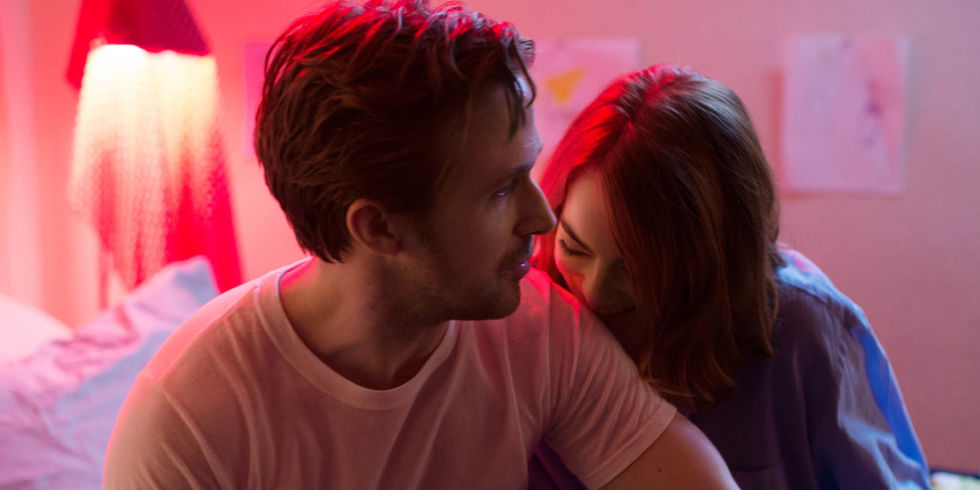
“You!” When a rain-soaked Stone stormed into a bar in “Crazy, Stupid, Love,” shouted that fateful word at Gosling, and planted a ferocious kiss on his lips, you could tell they had something. Not only that, but they quickly became a rarity: a modern movie couple who had appeared in multiple films together.
It’s easy to see why, especially when you watch Stone and Gosling riff off of each other seamlessly, firing off jokes and insults as if they were bullets (the scene in “La La Land” where she mocks him as he performs “I Ran” is already a cinematic monument). Yet they’ve also proved willing to tear off their armor and revel in the vulnerability of romance.
That much was obvious from the “Crazy, Stupid, Love” sequence where their reenactment of the most strenuous part of the climactic dance in “Dirty Dancing” gives way to a touching confession. But it’s better seen during their painful but wonderful goodbye on a park bench in “La La Land,” a moment so tender and immediate that you feel as if you’re sitting next to them. “I’m always gonna love you,” she tells him. The rest of us will be busy loving them both.
2. Emily Blunt and Matt Damon in “The Adjustment Bureau”
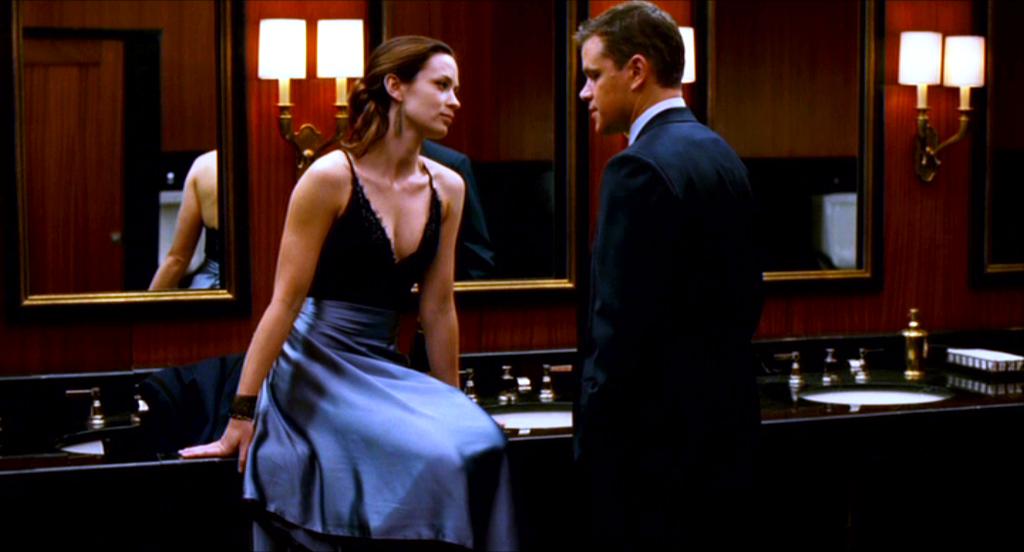
It’s hard to imagine a political contest zanier than last year’s grueling showdown between Hillary Clinton and Donald Trump. Yet it’s safe to say that neither of them experienced anything quite like what New York senatorial candidate David Norris (Damon) goes through in the beginning of this terrifically entertaining thriller: Capping off a restroom rehearsal of his concession speech by making out with Emily Blunt.
Blunt plays a tart-tongued ballerina in the movie and when you watch her with Damon, it’s difficult to accept the fact that they’re married to other people offscreen. It’s not just that they deftly exchange witty words almost as dexterously as Cary Grant and Katherine Hepburn; it’s that they masterfully embody two people who intuitively understand each other.
Just watch their magnetic acting when David declares that he’s looking forward to leaving the election behind and Elise replies with glee, “I don’t buy it. I think you love it.” She gets him, and he gets her back.
Much of “The Adjustment Bureau” revolves around the attempts of a mysterious, string-pulling organization’s battle to keep David and Elise apart, a dark kink in the plot demands some Shakespearean ardor from the two actors. They oblige beautifully, though they’re also delightfully playful around each other, especially when David tells Elise, “The day after the election, I woke up thinking about you.” She smiles…and then flirtatiously flips him off, which only makes him love her more.
1. Nicolas Cage and Téa Leoni “The Family Man”
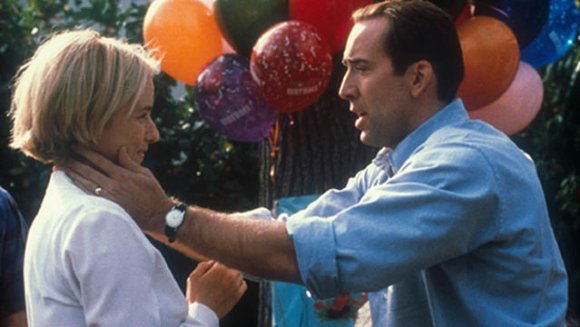
It begins at the airport. Jack Campbell (Cage) is saying goodbye to his girlfriend, Kate (Leoni). He’s off to pursue his dreams of financial glory in London when all of a sudden, she begs him not to go. “You want to do something great, Jack?” she asks him. “Let’s flush the plan.” But he waves away her plea and sets off for a life she’ll never fit into.
So begins “The Family Man,” which is that most unexpected of treats: A heartfelt, nuanced, and wise film from Brett Ratner. It’s the director’s unlikely homage to “It’s a Wonderful Life,” with Don Cheadle playing a Clarence-esque angel who offers Jack an unusual Christmas gift: the chance to briefly experience the life he would have had if he’d married Kate.
At first glance, it’s an existence Jack is relieved to have dodged, a world where he’s reduced to selling tires and wading through his fair share of marital squabbles. Yet even when they’re raging at each other in a shopping mall or fighting over one last slice of cake, you don’t doubt that Jack and Kate love each other.
That’s because Cage and Leoni have mastered the trick of conveying both longing and regret in the same moment. When Kate plummets from giddiness to despair when she realizes that Jack has forgotten about their anniversary, Leoni’s performance is crushing because she makes you feel the anguish of a woman who knows her husband is failing her, but still loves him unconditionally.
And when Jack watches a home video of himself singing “La La Means I Love You” to Kate during happier times, you see a flash of anger cross Cage’s face, which makes you realize that he’s playing a man who’s angry at himself for not being a better husband.
You would think these painful moments would make the film less romantic. Yet they don’t because by offering a multi-dimensional view of Jack and Kate’s marriage, Cage and Leoni make it matter more when their characters’ relationship is redeemed by their breathtaking loyalty to each other. Plus, their performances offer a build up to Jack’s return to the real world, where he begs Kate to stay with him for at least long enough for them to have coffee together.
How could she refuse?
Author bio: Bennett Campbell Ferguson is a freelance film critic and culture writer based in Portland, Oregon. In addition to reviewing films for Willamette Week, he founded the blog T.H.O. Movie Reviews, which he also edits.
Author bio: Bennett Campbell Ferguson is a freelance film critic and culture writer based in Portland, Oregon. In addition to reviewing films for Willamette Week, he founded the blog T.H.O. Movie Reviews, which he also edits. You can follow him on Twitter @thobennett.